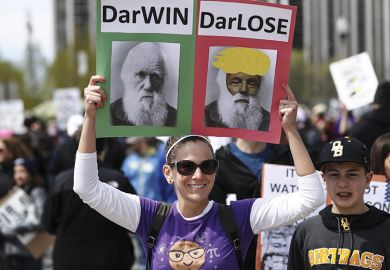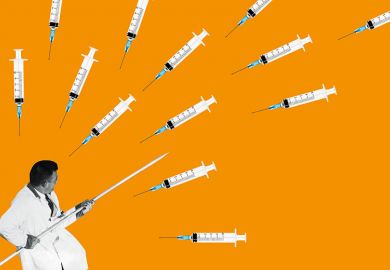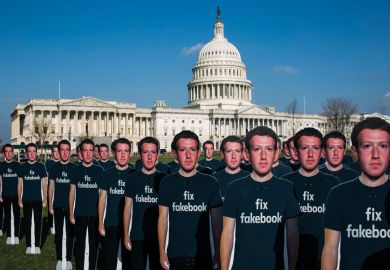US-based scientific journals are feeling driven by Trump administration anti-science rhetoric and mismanagement of the coronavirus pandemic into showing favourites in the presidential race, a risk their academic authors say they would prefer to avoid but feel they cannot.
Two of the world’s most prestigious biomedical journals, Cell and The New England Journal of Medicine (NEJM), are among science publications that have posted articles directly opposing Donald Trump’s re-election bid. Science magazine, while barred by its tax-exempt status from directly urging a vote against Mr Trump, is among journals that have repeatedly posted commentaries castigating his actions.
NEJM has made the most direct effort, with a commentary written by its top editors on behalf of the journal itself calling the Trump administration’s repeatedly botched handling of the coronavirus pandemic a national tragedy.
“When it comes to the response to the largest public health crisis of our time, our current political leaders have demonstrated that they are dangerously incompetent,” the editors say.
The journal’s editor-in-chief, Eric Rubin, a professor of immunology and infectious diseases at Harvard University, made clear his discomfort in leading the effort.
“We haven’t done this before, at least in the modern era, and I hope [we will] never feel compelled to do it again,” Professor Rubin told Times Higher Education. “We want to be seen as being dispassionate judges of science, clinical medicine and public health, but this is an extraordinary time with catastrophic mismanagement leading to an enormous number of deaths.”
Cell was somewhat more cautious, publishing a commentary written by three professors and a student at leading New York City medical schools who said they spoke only for themselves. The authors emphasised Mr Trump’s anti-immigrant policies, saying they “will destroy US science”.
“The current US president is not only hostile to immigrants but also to science, so getting out the vote this year to change this hostility is even more important for US science,” write the authors, from the Icahn School of Medicine at Mount Sinai and New York University.
“Although scientists often abhor politics, we do not have the luxury of remaining silent,” they write.
That level of hesitation reflects the potential risks. Scientists rely on the government for funding, and Mr Trump often suggests that the communication of facts and scientific analyses represents a partisan strategy against him.
But the bigger risk for scientists and academics is not standing up, said Holden Thorp, editor-in-chief of the Science journals.
Dr Thorp, a former chancellor of the University of North Carolina at Chapel Hill and provost of Washington University in St Louis, has repeatedly used his journal’s pages to hammer Mr Trump over his handling of the coronavirus pandemic.
He chafes at the lack of similarly blunt talk from his former colleagues in academia. “There’s a lot of tightrope-walking, and bobbing and weaving, because universities have so many different stakeholders,” Dr Thorp said. Yet, he continued, “Many university presidents look back on their time and say: ‘I wish I’d said more of what I truly believed.’”
One of Professor Rubin’s fellow editors at NEJM, Clifford Rosen, a professor of medicine at Tufts University, said he respected Dr Thorp’s sentiments but overall agreed with Professor Rubin’s caution.
Every article that goes into the journal has been assessed on whether it could change how a doctor treats a patient, Professor Rosen said. Faulting the Trump administration fitted that narrow measure, he said, because the White House had publicly sowed doubts over clear scientific advice on Covid.
As one example, he said, “There are doctors that are giving out hydroxychloroquine, and we have thousands of papers to show that it didn’t do anything.”
“I think that’s what we bristled at,” Professor Rubin said of his fellow physicians. “That we did our work, and tried to bring the best science to this world and to our country, and look what’s happening at the leadership level – nothing. In fact, it’s contradicting” scientific findings, he said.
The response to NEJM’s action has been overwhelming, Professor Rubin said. The article had about 1 million views within its first six hours online, for a journal whose “all-time record is like 30,000 hits in 24 hours”, he said.
The importance of the moment is finding broad recognition in higher education. “Scientists have a moral responsibility to speak out,” said Larry Sabato, a professor of politics at the University of Virginia.
Yet it is still not easy, said James Joyner, a professor of security studies at Marine Corps University, who has written about the dilemma that Mr Trump poses for institutions such as the military that strive to remain apolitical.
Soldiers and physicians alike understand that they can lose prestige and credibility by taking sides in politics, Professor Joyner said. At this moment, however, “they have, rightly, decided that the situation is so dire that they have to take that risk”.
POSTSCRIPT:
Print headline: Science journals risk reputations to join battle to unseat Trump
Register to continue
Why register?
- Registration is free and only takes a moment
- Once registered, you can read 3 articles a month
- Sign up for our newsletter
Subscribe
Or subscribe for unlimited access to:
- Unlimited access to news, views, insights & reviews
- Digital editions
- Digital access to THE’s university and college rankings analysis
Already registered or a current subscriber?








